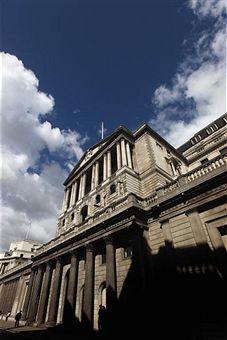 He left with a warning. “I think that there is a big risk emerging to the
credibility of the Bank,” said Andrew Sentance
last night, on his final day as a member of the Monetary Policy Committee. And he continued, “If inflation does not come down in the way that the Bank is suggesting — and I think
there is a big risk that is the case — then that is going to have a big knock on effect on the credibility of the bank’s commitment to its inflation target.”
He left with a warning. “I think that there is a big risk emerging to the
credibility of the Bank,” said Andrew Sentance
last night, on his final day as a member of the Monetary Policy Committee. And he continued, “If inflation does not come down in the way that the Bank is suggesting — and I think
there is a big risk that is the case — then that is going to have a big knock on effect on the credibility of the bank’s commitment to its inflation target.”
Sentance’s views are unsurprising. He has, after all, been pushing for an interest rate hike for some time, and for the reason he outlined last night: “what I find difficult to see is a Monetary Policy Committee not responding at all when inflation is so much above target and the economy has turned round so far from the situation we were in a couple of years ago when we brought interest rates down to half a percent.” But this latest intervention is still another example of how the battle over interest rates is spilling out from Threadneedle Street and across the public domain. Only last weekend, the Bank’s chief economist told the FT that we ought to plan for rate hikes over the next two years. A few days later, the MPC’s Adam Posen responded with an article for the paper, entitled, “Now is not the time to raise interest rates.”
The argument, really, is over the persistence of our inflation. The Bank’s official position, or at least that contained within its forecasts, is that a series of temporary factors — such as food prices, oil and taxes — will settle naturally by the middle of next year, to bring inflation down to its target level. Sentance’s worry — and one shared by many City economists — is that the factors behind British inflation are more permanent than that. At the moment, it’s anyone’s guess. But, as I said last week, the Bank’s record on predicting inflation hardly inspires confidence. Here’s the graph from Citi:

Sentance’s replacement on the MPC, Ben Broadbent, is thought to be more attuned to the idea of keeping rates where they are. In which case, the Posen side of the argument may already have triumphed. But how strange their administrations may look in a year’s time, if inflation exceeds expectations yet again.






Comments